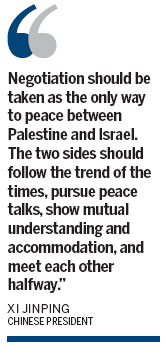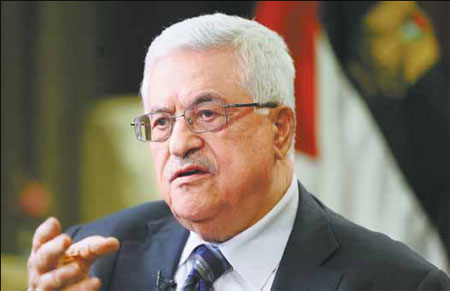Xi calls for Middle East talks
|
Palestinian President Mahmoud Abbas spoke at a joint news conference at the Diaoyutai State Guesthouse in Beijing on Monday night. Xu Jingxing / China Daily |

President Xi Jinping called for talks between Palestine and Israel on Monday amid an unusual diplomatic situation in which leaders of both countries made separate, overlapping visits to China.
Analysts said the simultaneous visits of Palestinian President Mahmoud Abbas and Israeli Prime Minister Benjamin Netanyahu show that China is in a unique position to help solve the Palestinian issue because it maintains good relations with both sides.
Xi made the call for talks when meeting Abbas at the Great Hall of the People in Beijing.
According to a statement from the Foreign Ministry, Xi said "negotiation should be taken as the only way to peace between Palestine and Israel. The two sides should follow the trend of the times, pursue peace talks, show mutual understanding and accommodation, and meet each other halfway".
Talks between Israel and Palestine have been deadlocked for four years and there was no indication that a meeting would take place.
The president also said that the right direction should be an independent Palestinian state and the peaceful co-existence of Palestine and Israel. "At the same time, Israel's right to exist and its legitimate security concerns should also be fully respected," Xi said.
The immediate priority is to stop settlement activities, end violence against innocent civilians, lift the blockade of the Gaza Strip and properly handle the issue of Palestinian prisoners to create the necessary conditions for the resumption of peace talks, Xi said.
Objective stance
Abbas said his country highly appreciates China's objective stance on the Palestine issue and expects Beijing to continue playing an important role.
They later witnessed the signing of agreements on economic technical cooperation and cultural exchanges.
Abbas also met Premier Li Keqiang on Monday. Li said China will use "its own way and its own impact" to promote the peace talks.
Also on Monday, Netanyahu began a visit to the financial hub of Shanghai. He is due in Beijing on Wednesday following Abbas' departure on Tuesday.
This is the first trip by a top Israeli leader to China since former Israeli prime minister Ehud Olmert visited in 2007. It is reported Netanyahu is due to sign a number of deals and discuss the issue of Iran.
China has maintained close relations with the Palestinians for decades. In recent years, it has also developed good ties with Israel.
Speaking to Xinhua News Agency ahead of the visit, Abbas said "it is very good that Netanyahu will visit China too because it is a good opportunity that the Chinese listen to both of us".
The Foreign Ministry said last week it would be willing to help set up a meeting between Abbas and Netanyahu if they want to, but the two leaders were not expected to be in the same city at the same time.
Bigger role for China
China's special envoy for the Middle East, Wu Sike, told reporters earlier that the fact that Israeli and Palestinian leaders were invited to China for a visit not long after the new Chinese government was formed indicates the importance China's new leadership attaches to Middle East issues.
Beijing raised such a proposition for the first time to seek a bigger role in promoting peace in the Middle East, said Li Shaoxian, an expert of Middle East studies at China Institutes of Contemporary Relations. China aims to solidify international consensus, including that Israeli-Palestinian peace remains the core issue of the Middle East, and to address urgent issues such as Israel halting settlement construction, he said.
US-sponsored talks between Israel and the Palestinians broke down in 2010 over the issue of Jewish settlements. Palestinians say peace talks require a halt to settlement construction in the West Bank and East Jerusalem, but Israel rejects the demands and says peace talks should resume without preconditions.
"The US still enjoys an influential say during the process and China's role can hardly match that of Washington in the region in the near future, but the international community, including China, should all make their contributions to promote the process," Li added.
Contact the writers at lixiaokun@chinadaily.com.cn and zhaoshengnan@chinadaily.com.cn
(China Daily 05/07/2013 page12)









